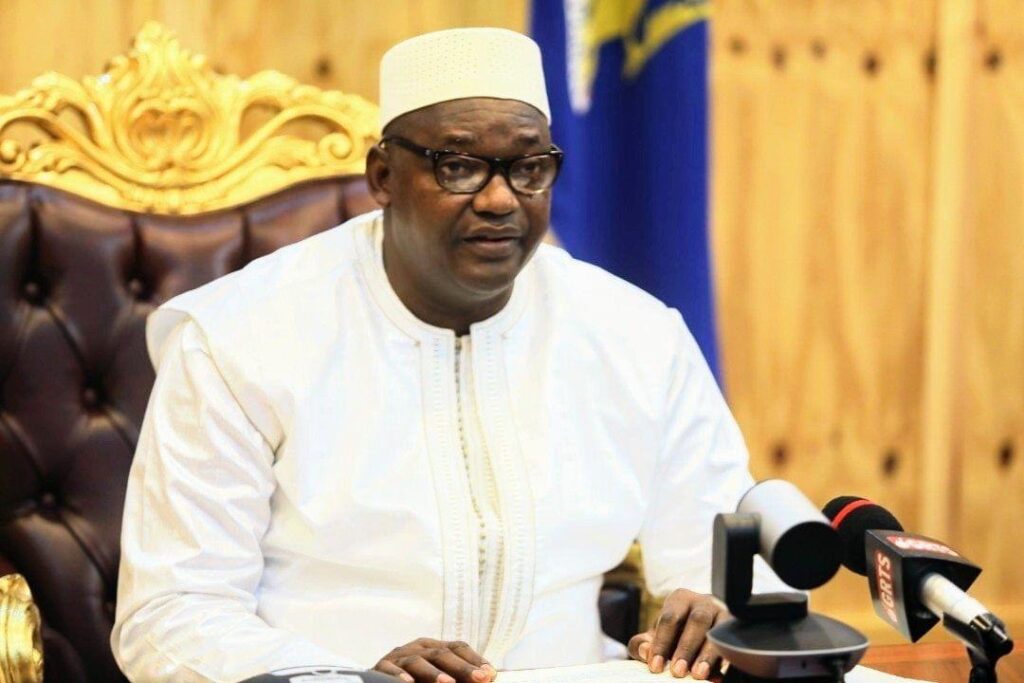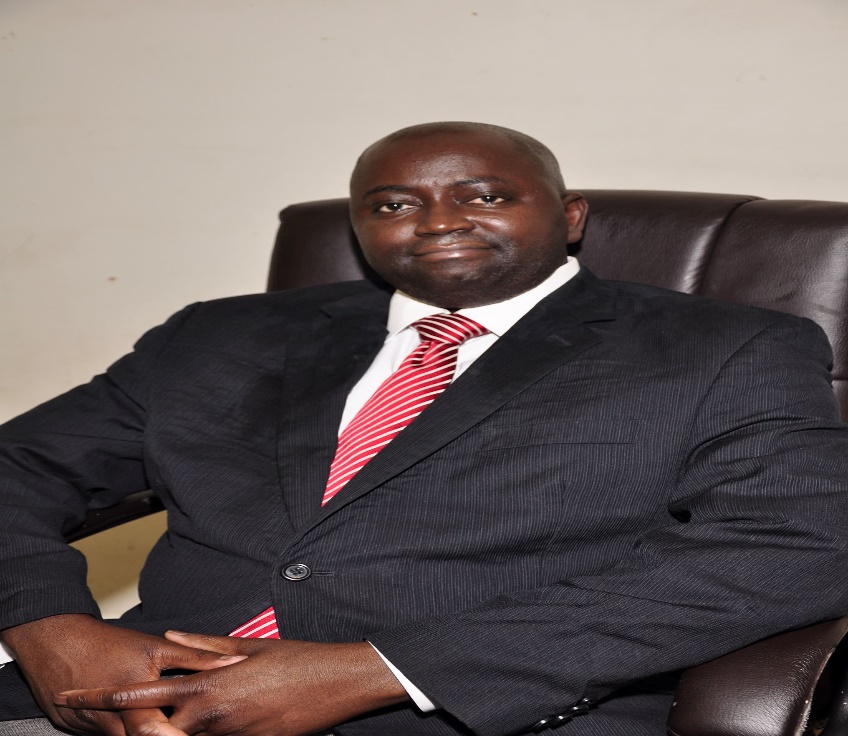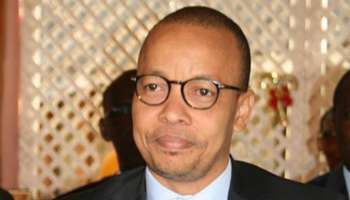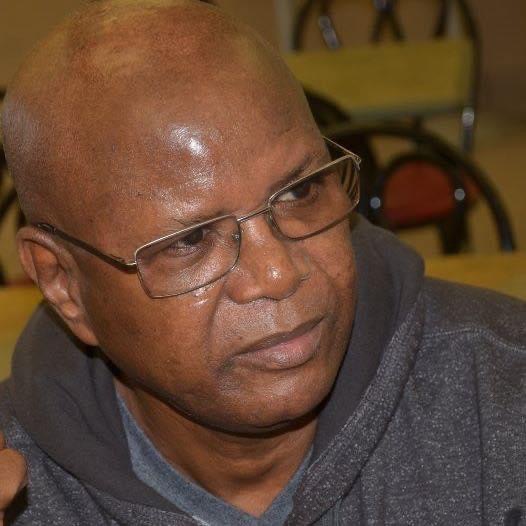
Arfang Madi Sillah, a Washington D.C.-based Gambian scholar and commentator, has written a compelling and thought-provoking book titled The Curtain Falls on the Press and Presidency Relationship—Barrow Goes Berserk.
Known for his incisive political analysis and deep understanding of Gambian affairs, Sillah examines the fraught relationship between the press and the presidency in The Gambia, particularly under President Adama Barrow’s administration.
Below is an abridged version of the book.
Chapter 1: A Marriage of Convenience
In the euphoria that followed Yahya Jammeh’s much-celebrated departure, the Gambian media found itself at a precarious crossroads, straddling the line between cautious optimism and profound skepticism. For decades, under the tyrannical fist of Jammeh’s regime, the press had been a battered and bruised entity—pushed to the margins, suffocated by censorship, and, at times, snuffed out with brutal precision.
Jammeh didn’t just silence dissent; he obliterated it, as one might crush a mosquito—swift, ruthless, and with little regard for the consequences. But with Adama Barrow’s ascent to power, there was a collective sigh of relief across the newsrooms of Banjul and beyond.

It seemed as though the long nightmare of press suppression had finally come to an end. Barrow, an unassuming political figure with the air of a man who had stumbled into power, promised democracy, reform, and, most tantalisingly, freedom for the press.
Even the late Pa Nderry Mbai, the most combative voice in Gambian journalism, couldn’t hide his elation. Mbai’s Freedom newspaper and radio station had, in many ways, led the charge that ultimately toppled one of the most brutal regimes in modern African history.

For Mbai and his comrades in the media, Jammeh’s ousting was proof that no dictatorship, no matter how entrenched, could withstand the relentless pursuit of truth. His broadcasts, often from the diaspora, had stirred the pot enough to keep the fire of rebellion alight, and now he stood victorious—or so it seemed.
But as any Fleet Street editor will tell you, the glow of political victory often dims under the harsh light of reality. Barrow, who had ascended to power with promises of press freedom, soon revealed the same old tricks of the trade, dressed in new robes.
The early days of Barrow’s administration were filled with carefully staged gestures, designed to lull the media into a sense of security. Smiles were exchanged, hands shaken, and an air of cooperation seemed to hang over the corridors of power. For a fleeting moment, the press thought it had finally found an ally in government—a meek leader who understood the value of a free media. But, as with all political theatre, the opening act was little more than a well-rehearsed ruse.
What followed was a deft exercise in manipulation, cloaked in such quiet subtlety that only the most perceptive observers could grasp its full extent. Barrow, eager to distance himself from the brutish tactics of his predecessor, did not come with clubs or guns. He came with a smile, handshakes, and offers of high office.

The press, once a ferocious beast, was invited into the halls of power, where it would dine at the same table as the very politicians it had spent years scrutinising. The first notable move came when Demba Ali Jawo, a veteran journalist whose pen had often skewered the Jammeh regime, was appointed Minister of Information.
To many, this appointment seemed a signal that Barrow intended to uphold the values of transparency and press freedom. After all, what better way to prove one’s commitment to the Fourth Estate than by elevating one of its own to the corridors of power? But in hindsight, it was the first step in what would become a methodical campaign to neutralise the press.
Soon after, Ebrima Sillah, another respected journalist, was named Director General of GRTS, The Gambia’s state-owned broadcaster. His rise through the ranks was cemented when he too was promoted to Minister of Information, a position that placed him at the heart of Barrow’s communications apparatus.
As the months wore on, other familiar faces from the world of journalism were also drawn into Barrow’s ever-expanding inner circle. Amie Bojang-Sissoho became Director of Press and Public Relations at the State House, while Dr. Ebrima Sankareh assumed the role of government spokesperson.
To the untrained eye, this parade of appointments appeared to be the ultimate endorsement of press freedom—a government that genuinely valued journalists. But for those with a nose for political theatre, the truth was much darker. By welcoming journalists into the fold, Barrow wasn’t empowering them; he was taming them. Much like the way Vladimir Putin turned Russian oligarchs into lapdogs by giving them a stake in his regime, Barrow had figured out that the best way to silence the press was not through brute force, but through co-option.
For the press, this was the beginning of a slow, steady decline. Once fierce critics of the state, journalists now found themselves in government, sipping tea in air-conditioned offices, far removed from the gritty realities of investigative reporting. The boundaries between the press and the state became so blurred that, for all intents and purposes, they no longer existed. It was reminiscent of what happened in Hungary under Viktor Orbán, where journalists were methodically absorbed into the state’s machinery until the once-robust press was reduced to a shadow of its former self.
The co-option didn’t stop at the upper echelons of the media. Lower-ranking journalists, who had once made names for themselves by exposing corruption and holding officials accountable, soon found themselves in cushy government jobs, often with salaries and perks far exceeding what they had earned in their newsrooms. Notable figures like Sana Camara, Nyfally Fadera, Lamin Njie, Bai Emil Touray, Aminata Sanneh, and Prince Baboucarr Aminata Sankanu, who had once been vocal advocates for press freedom, were now comfortably ensconced in the very structures of power they had once railed against. It was, in many ways, a marriage of convenience—journalists traded their pens for pay-checks, their principles for prestige.
Given the considerable number of high-profile appointments of journalists into the ranks of Adama Barrow’s government, one might reasonably have anticipated a harmonious and productive relationship between the state and the media. One could even assume that such a marriage would foster coherent government policies, rooted in effective communication.
However, in what can only be described as a most paradoxical turn of events, it appears that many, if not all, of the former journalists now embedded within government circles are proving to be even less capable than the politicians they once vociferously criticised. Their once-vocal critiques have been silenced, and in their place, we find nothing but obsequiousness, carried out with a fervour that would not seem out of place in a grand Greek tragedy. The longer these individuals remain ensconced in government, the more their shortcomings are laid bare for all to see.

Not only is their ineptitude increasingly exposed, but their inability to tell truth to power actively undermines the government itself. Far from providing the constructive critique required to shape sound, solution-based public policies, these former journalists mislead the government, offering little more than sycophantic flattery. They have become complicit in perpetuating poor decisions, thus deepening the malaise of governance rather than offering the honest insights necessary to address it.
From the perspective of anyone with even a modest education, it is clear that the majority of government communications—whether in the form of press releases or policy documents—are not only poorly composed but also marred by blatant plagiarism. This revelation begs the question: who had been writing these journalists’ articles when they were in the newsroom? Were these supposed top-notch journalists relying on ghostwriters all along, or did they owe their semblance of competence to the skilful hands of editors, who painstakingly transformed their crude drafts into publishable pieces?
As if originality were too much effort, Barrow appears to have taken the art of co-opting critics straight from the dusty archives of authoritarian survival kits. Rather than craft his own strategy, Barrow, ever the diligent apprentice, seems to have gazed across the border and thought, “Why reinvent the wheel when I can borrow it wholesale?”
Barrow’s strategy of co-opting critical voices from the Gambian media closely mirrors that of his political mentor, former Senegalese President Macky Sall. In Senegal, Sall’s strategy to weaken the media was no less artful. The once-vibrant Senegalese press, hailed as a model of independence in West Africa, saw its brightest stars co-opted into the very halls of power they had once critiqued. Journalists like Abdou Latif Coulibaly, who had fearlessly exposed corruption in Senegalese politics, found themselves occupying high offices in Sall’s administration.
Coulibaly, once a formidable critic of the state, became Secretary-General of the Government, his voice slowly fading into the cacophony of political sycophancy.
Then there was Suleiman Jules Diop, a heavyweight in Senegalese journalism, who transitioned from anchor desk to government communications advisor. It doesn’t stop there. Notable figures such as Yakham Mbaye, formerly the editor-in-chief of the influential Le Populaire, ascended to the role of Senegal’s Minister of Communication.
Others, like El Hadji Hamidou Kassé, nestled into Macky Sall’s inner circle as strategic advisors, subtly transforming the media into little more than an extension of state power. The once-vibrant press, a staunch bastion of accountability, was gradually muted, its critical voices absorbed into the very machinery of government they once scrutinised.
With each appointment, the lion’s teeth were pulled, leaving nothing but a docile creature incapable of dissent. This chilling trend was mirrored in the Gambian media under Barrow’s rule, where once fierce journalists were plied with government positions until they were no longer a threat. It was like watching a Shakespearean tragedy unfold, where the very critics of the regime became the architects of its propaganda.
However, this façade of harmony crumbled when Abdou Latif Coulibaly resigned as Secretary General of the Government on October 7, 2023. His resignation was a direct response to President Sall’s contentious decision to postpone the presidential election originally scheduled for February 25, 2024.
This delay arose from a tumultuous clash between the National Assembly and the Constitutional Court over candidate eligibility, igniting a firestorm of institutional conflict that severely compromised the integrity of the electoral process. In stepping down, Coulibaly invoked a yearning for “full and complete freedom” to champion his political convictions, thereby illuminating the deepening fissures within Sall’s administration and the rising political tensions in Senegal.
This rupture underscores a broader discontent within the political landscape, as critics decry Sall’s apparent subversion of democratic processes—an unsettling echo of Barrow’s own stratagems in The Gambia.
Barrow would do well to heed the cautionary tale of Sall’s experience: no amount of public relations finesse or media manipulation can ultimately salvage a corrupt and ineffective government. Just as Sall eventually faced the wrath of the Senegalese electorate, Barrow too will find that the Gambian people will not be fooled forever. His attempts to neutralise the press may grant him temporary refuge from scrutiny, but in the end, history is a relentless arbiter.
The people will demand justice, and when they do, Barrow may find that the very press he thought he had tamed will be the first to turn on him, the very politicians he imagined were securely in his pocket will abandon him at the first whiff of danger, jumping ship with the kind of speed only opportunists can muster.
The bureaucrats he relied on, those faithful servants of power, will resign en masse, turning their backs on him as though he had become a leper overnight. This isn’t conjecture—it has happened before, not only to Sall but to his predecessor Yahya Jammeh. In the eleventh hour of Jammeh’s reign, ministers, ambassadors, directors, and even his most sycophantic cronies scrambled for the exits, disavowing him with the fervour of born-again critics.
It was a spectacle in political treachery: those who had once sung Jammeh’s praises with nauseating zeal suddenly found their moral compass, resigning in droves and denouncing him as if they had only just discovered he was a dictator. The hypocrisy was palpable, as they postured as if they had been blind to his atrocities all along.
Barrow is walking the same perilous path, and if he continues, he will find himself starring in this same tragicomedy. The very people he has surrounded himself with will, in the final act, turn from fawning courtiers to vengeful accusers, each eager to distance themselves from the impending wreckage. He will be left to face the cold reality that, in the world of politics, loyalty is as fleeting as the power that sustains it. And when the curtain falls, he will be left with nothing but the bitter irony of watching his carefully cultivated allies become his most fervent critics, their newfound moral clarity as hollow as their loyalty once was.
In a nutshell, the marriage of convenience between Barrow and the press is nothing new. It’s a tale as old as time, repeated throughout history by leaders who believe that by buying the silence of their critics, they can secure their place in power. But as every Fleet Street editor knows, you can’t muzzle the truth forever. The watchdog may have been coddled into submission for now, but there will come a day when it remembers how to bare its teeth. And when that day comes, Barrow will find himself very much alone, betrayed by the very journalists he once sought to control.
To be continued.










Recent Comments